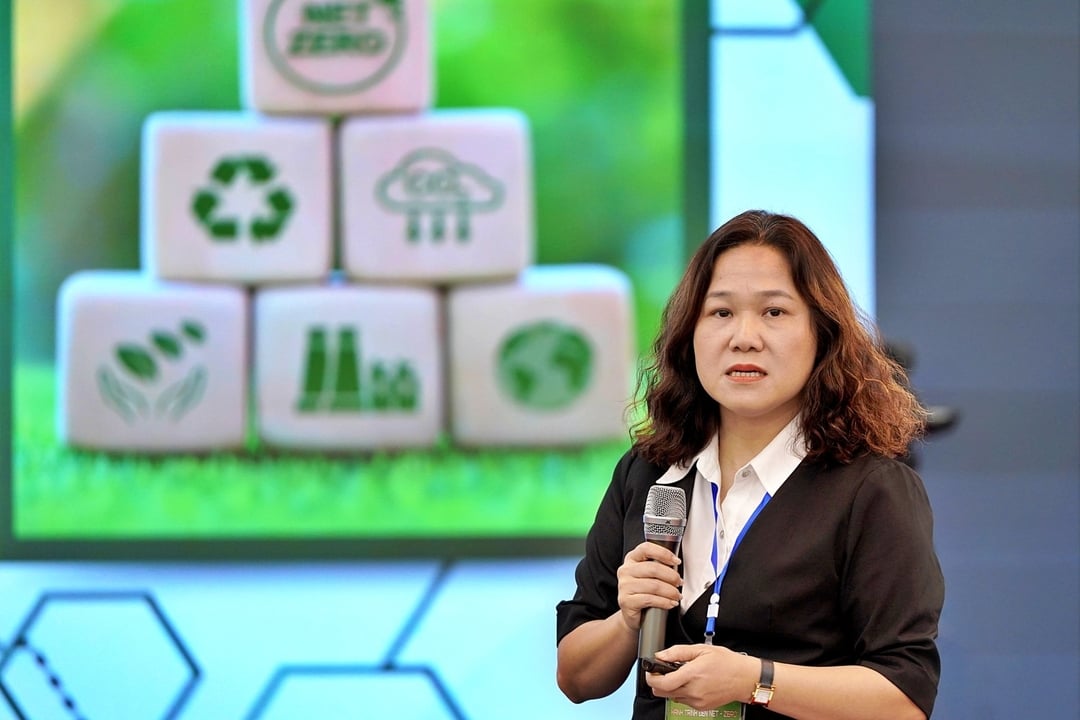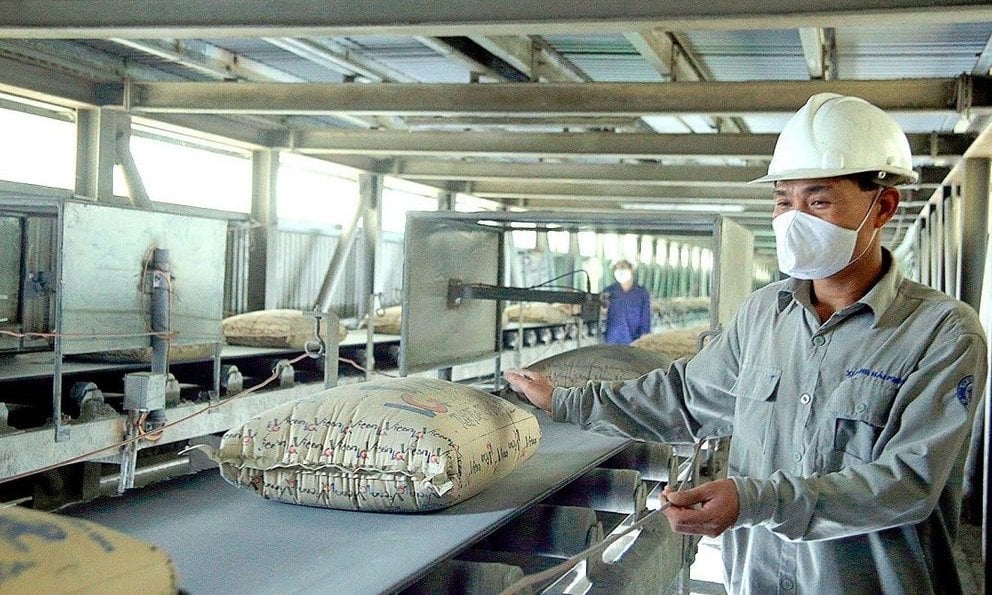December 31, 2025 | 00:24 GMT +7
December 31, 2025 | 00:24 GMT +7
Hotline: 0913.378.918
December 31, 2025 | 00:24 GMT +7
Hotline: 0913.378.918

Dr. Dinh Thi Hai Van, Institute of Green Growth Research (Vietnam National University of Agriculture). Photo: Bao Thang.
"There was a time when businesses avoided people like us," said Dr. Dinh Thi Hai Van of the Institute of Green Growth Research (Vietnam National University of Agriculture), reflecting on the journey from outright rejection to proactive cooperation by the business community in the emission reduction effort.
In just a few years, greenhouse gas transparency has shifted from an "academic" concept to a mandatory condition for exports. When consulting on Net Zero roadmaps for businesses, Dr. Van noted that major markets such as the EU, the United States, and Japan are tightening controls on high-emission goods.
Specifically, the EU has officially implemented the Carbon Border Adjustment Mechanism (CBAM), which requires all imported goods in high-emission sectors such as steel, aluminum, and cement to disclose emission levels and pay additional taxes if emissions exceed thresholds.
In the United States and Japan, importers also demand transparency on carbon footprints and greenhouse gas reports. Failure to comply may result in exclusion from orders or supply chains.
Beyond governments, multinational corporations such as Apple, Unilever, and IKEA have also set stringent requirements for emission transparency and ESG (Environmental, Social, and Governance) reporting. Without compliance, Vietnamese businesses may be excluded from the supply chain.
Going forward, once experienced, businesses can begin greenhouse gas inventories using international standards such as the GHG Protocol and ISO 14064. This serves as a foundation for emission reduction planning and ESG report preparation. "If you don't measure it, you can't improve it. Businesses must identify this foundational step for their Net Zero action plans," Dr. Van emphasized.
In reality, early adopters are seeing clear advantages. Vinamilk has achieved PAS 2060 certification and aims for Net Zero by 2050. TH True Milk maintains carbon neutrality at two of its subsidiaries through 2028. Hoa Phat, the region’s largest steel producer, allocates 30% of its investment capital to environmental efforts and self-generates 80% of its electricity.
As such, challenges are increasingly falling on the SME sector, which typically lacks experience, human resources, and financial capacity. These enterprises have limited access to standard processes and often do not fully understand international requirements.
To provide support, the Institute of Green Growth Research and consulting organizations have launched a "one-stop" model to assist businesses with emission inventories, reduction planning, green credit consultation, and ESG report preparation following international GRI standards.

Small and medium-sized enterprises face significant pressure regarding greenhouse gas inventories.
According to Decree No. 06/2022/ND-CP on greenhouse gas emission reduction and ozone layer protection, only enterprises classified as major emitters are required to conduct periodic greenhouse gas inventories starting in 2026.
The criteria for inventory obligations include: emitting 3,000 tons of CO2 equivalent per year, consuming more than 1,000 TOE of energy annually (equivalent to 4,186 GJ or 1,000 tons of oil equivalent), or operating in the energy, industry, transportation, construction, agriculture, or waste treatment sectors.
Thus, SMEs are also subject to inventory requirements if they exceed these thresholds, regardless of workforce size or revenue.
Tran Cong Hoa, Chairman of the Board of Mai Hoa Group, admitted that many businesses are still confused due to a lack of clarity on required declarations. Additionally, the cost of compliance and administrative procedures associated with emission reduction measures has deterred many companies.
However, Mr. Hoa believes that working toward Net Zero and obtaining related certifications will help businesses enhance competitiveness and brand reputation in both domestic and international markets. He expressed a desire to connect more with programs like "For a Green National Environment" to stay informed and identify suitable solutions.
Sharing this view, Dr. Dinh Thi Hai Van stated that SMEs are the most vulnerable group in the transition to a low-carbon economy. As mechanisms like CBAM and ESG standards become stricter, multinational corporations will require their SME suppliers to inventory and disclose emissions to maintain contracts.
According to Dr. Van, conducting greenhouse gas inventories is not overly complex if approached step-by-step: measure, report, reduce, offset. SMEs can start by inventorying Scope 1 and Scope 2 emissions, the easiest categories to implement, including direct emissions from fuel (gasoline, oil, LPG, etc.) and indirect emissions from electricity consumption. Data can be collected from existing electricity and fuel bills and operational records.
The final step is to develop a carbon neutrality action plan, with specific goals such as reducing emissions by 10–20% per ton of product over five years, combined with carbon offsetting through reforestation projects, green investments, or the purchase of carbon credits.
Dr. Van recommends that businesses consider 2025 as a "rehearsal year" for greenhouse gas inventory activities. Standardizing processes early on will help businesses save costs and avoid being caught off guard when official regulations take effect in 2026.
Translated by Huong Giang
/2025/12/25/2157-2-170845_745.jpg)
(VAN) Amid the impacts of climate change and market competition, An Giang's agriculture is shifting toward a green, modern growth model, creating a key driving force for restructuring the sector.

(VAN) Two leading enterprises in the agricultural sector have officially cooperated to implement a sustainable value chain model for Viet Nam's shrimp industry.

(VAN) Dien Bien is speeding up ODA projects to respond to climate change and strengthen water management and disaster prevention infrastructure in pursuit of sustainable development.

(VAN) With high automation, large capacity, and a green development orientation, the Hai Duong Plant Branch is becoming an important anchor for the animal feed market.
/2025/12/01/2936-2-222331_70.jpg)
(VAN) Mortgaging his house and giving up a pharmaceutical management career, Mr. Nguyen Quang Duy succeeded in bringing Khanh Hoa's sea grapes to demanding markets such as Japan and the U.S.

(VAN) The large-scale agroforestry investment project aims to develop a leading sustainable agro-industrial center in Angola.
/2025/11/28/3433-1-212821_213.jpg)
(VAN) Many localities across the coconut land of Vinh Long are replicating emission-reducing models in production and daily life, contributing to the targets for emission reduction and green economic development.